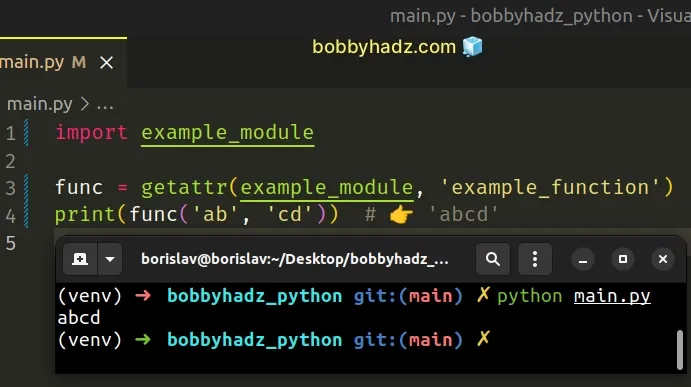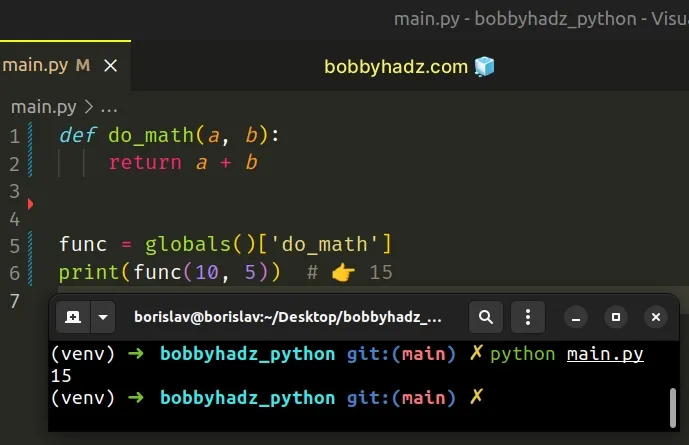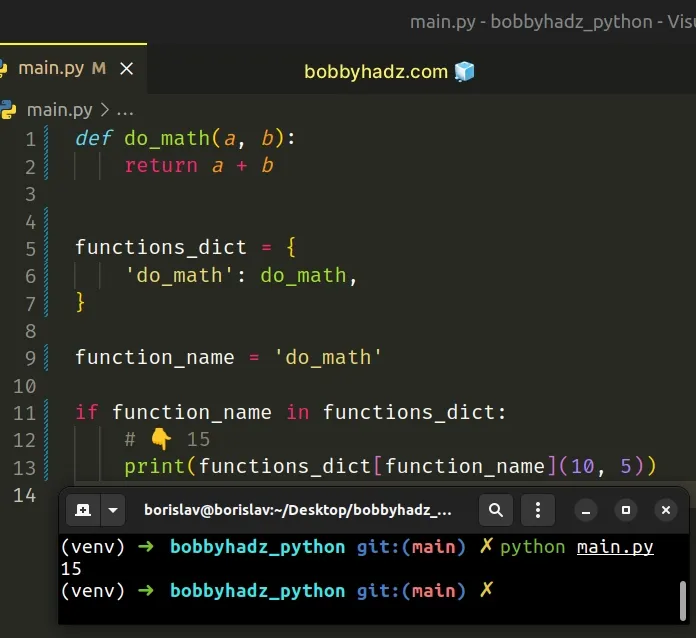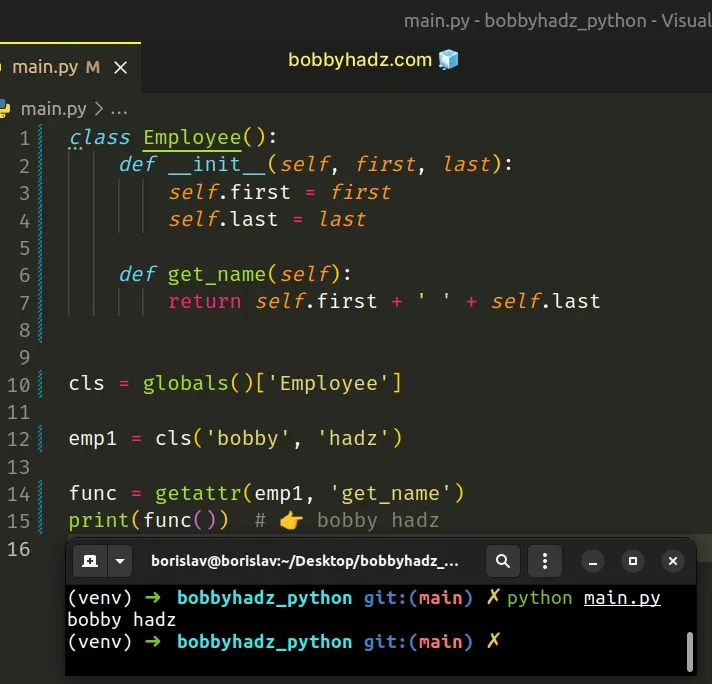Call a Function by a String name in Python
Last updated: Apr 10, 2024
Reading time·6 min

# Table of Contents
- Call a function by a String name in Python
- Call a function by a String name using globals()
- Call a function by a String name using a dictionary
- Call a class method by a String name in Python
- Call a function by a String name using locals()
- Call a function by a String name using eval()
- Call a function by a String name using exec()
# Call a function by a String name in Python
To call a function by a string name:
- Import the module the function is defined in.
- Use the
getattr()function to get the function. - Call the function.
If you need to call a function given a string name and the function is defined in a different module, you first have to import the module.
import example_module func = getattr(example_module, 'example_function') print(func('ab', 'cd')) # 👉️ 'abcd'
The code sample assumes that there is a module named example_module located in
the same directory.
def example_function(a, b): return a + b

Once we have the module that defines the function imported, we can use the
getattr() function to get the function by a string name.
The getattr() function returns the value of the provided attribute of the object.
The function takes the following parameters:
| Name | Description |
|---|---|
| object | the object whose attribute should be retrieved |
| name | the name of the attribute |
| default | a default value for when the attribute doesn't exist on the object |
The getattr() function will return the function, so the last step is to invoke
it and provide all the required arguments.
import example_module func = getattr(example_module, 'example_function') print(func('ab', 'cd')) # 👉️ 'abcd'
If the function is defined in the same module, use the globals() function.
# Call a function by a String name using globals()
This is a three-step process:
- Use the
globals()function to get a dictionary containing the current scope's global variables. - Use the string as a dictionary key to get the function.
- Call the function.
def do_math(a, b): return a + b func = globals()['do_math'] print(func(10, 5)) # 👉️ 15

The globals function returns a dictionary that implements the current module namespace.
def do_math(a, b): return a + b # {'__name__': '__main__', '__doc__': None, '__package__': None, '__loader__': <_frozen_importlib_external.SourceFileLoader object at 0x7f151f799de0>, '__spec__': None, '__annotations__': {}, '__builtins__': <module 'builtins' (built-in)>, '__file__': '/home/borislav/Desktop/bobbyhadz_python/main.py', '__cached__': None, 'do_math': <function do_math at 0x7f151f8e3d90>} print(globals())
You can use the string to access the specific key in the dictionary.
There is a key with the function's name that points to the actual function.
If a function with the given name doesn't exist in the module, you'd get a
KeyError exception.
The last step is to use parentheses to call the function providing it any arguments it requires.
# Call a function by a String name using a dictionary
Alternatively, you could define a dictionary that maps function names to the actual functions.
def do_math(a, b): return a + b functions_dict = { 'do_math': do_math, } function_name = 'do_math' if function_name in functions_dict: # 👇️ 15 print(functions_dict[function_name](10, 5))

The functions_dict dictionary has function names as keys and the actual
functions as values.
If if statement checks if the specified string is present in the dictionary
before calling the function.
You can use the getattr() function if you need to call a class method by a
string name.
# Call a class method by a String name in Python
To call a class method by a string name:
- Instantiate the class to get an object.
- Use the
getattr()function to get access to the method. - Call the method.
class Employee(): def __init__(self, first, last): self.first = first self.last = last def get_name(self): return self.first + ' ' + self.last cls = globals()['Employee'] emp1 = cls('bobby', 'hadz') func = getattr(emp1, 'get_name') print(func()) # 👉️ bobby hadz

self as the first argument to the getattr() function.If the class is defined in a different module, you would have to import it.
You can either import the class directly or use the importlib.import_module()
method.
# Importing a class and calling a method by string name
Here is an example that imports the class directly and calls a method by a string name.
import example_module cls = getattr(example_module, 'Employee') emp1 = cls('bobby', 'hadz') func = getattr(emp1, 'get_name') print(func()) # 👉️ bobby hadz
The code sample assumes that there is a module named example_module located in
the same directory.
class Employee(): def __init__(self, first, last): self.first = first self.last = last def get_name(self): return self.first + ' ' + self.last
We used the getattr() function to get the class and then used the function to
get the method.
The last step is to invoke the method.
# Using importlib to import the module before calling the method by string name
Here is an example that uses the importlib.import_module() method to import
the module before calling a specific method given a string name.
import importlib module = importlib.import_module('example_module') cls = getattr(module, 'Employee') emp1 = cls('bobby', 'hadz') func = getattr(emp1, 'get_name') print(func()) # 👉️ bobby hadz
The code sample assumes that there is a module named example_module in the
same directory and the module defines an Employee class.
The importlib.import_module method takes the name of a module and imports it.
The name argument can be absolute or relative, e.g. pkg.module or
..module.
If you use a relative package name, e.g. ..module, you have to pass a second
argument to the import_module() method, e.g.
import_module('..module', pkg.subpkg') imports pkg.module.
# Call a function by a String name using locals()
If the function you need to call is located in the same module, you can also use
the locals() dictionary.
def example_function(a, b): return a + b # 👇️ 105 print( locals()['example_function'](50, 55) )
This approach is similar to using the globals() dictionary, however, the
locals() function returns a dictionary that contains the current scope's local
variables, whereas the globals dictionary contains the current module's
namespace.
# Using globals() vs locals() to call a function by string name
Here is an example that demonstrates the difference between the globals() and
the locals() dictionaries.
def example_function(): return 'GLOBAL example function' def call_function_by_string_name(): def example_function(): return 'LOCAL example function' # 👇️ GLOBAL example function print(globals()['example_function']()) print('-' * 30) # 👇️ LOCAL example function print(locals()['example_function']()) call_function_by_string_name()
The function with the name example_function is defined in the global and local
scopes.
When we used the globals() dictionary, we called the global function (the one
from the outer scope).
When we used the locals() dictionary, we called the local function (the one
that is defined inside the function).
# Call a function by a String name using eval()
You can also use the eval() function to call a function by string name.
def greet(name): return f'hello {name}' function_name = 'greet' func = eval(function_name) print(func) # 👉️ <function greet at 0x7f7e978504a0> print(func('Bobby Hadz')) # 👉️ hello Bobby Hadz
The eval function takes
an expression, parses it and evaluates it as a Python expression using the
globals and locals dictionaries as the global and local namespace.
eval() function should only be used with trusted code. Don't use eval() with user-generated data.The eval() function basically tries to run the given expression, so it should
never be used with untrusted code.
# Call a function by a String name using exec()
You can also use the exec() function to call a function by string name.
def greet(name): return f'hello {name}' function_name = 'greet' exec(f'my_func={function_name}') print(my_func) # 👉️ <function greet at 0x7f7e978504a0> print(my_func('Bobby Hadz')) # 👉️ hello Bobby Hadz
exec() function with untrusted user input.The exec function supports dynamic execution of Python code.
The function takes a string, parses it as a suite of Python statements and runs the code.
We assigned the result of evaluating the string name to the my_func variable.
You can then use the my_func variable to invoke the function as shown in the
code sample.
When using this approach, you are likely to get linting warnings because the
variable is declared implicitly using exec().
# Additional Resources
You can learn more about the related topics by checking out the following tutorials:
- How to check if a variable is a Function in Python
- Get all arguments passed to a Function in Python
- Why does my function print None in Python [Solved]
- How to Print the output of a Function in Python
- How to call a Function N times in Python
- Run a Function or a Loop only Once in Python
- How to use a Variable from another Function in Python
- How to use Function Pointers in Python

